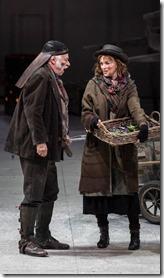
A gorgeous gift to the ears
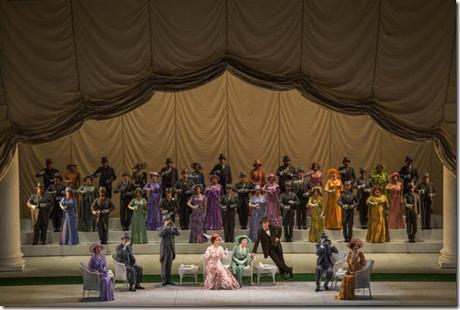
Review by Catey Sullivan
There's no denying that My Fair Lady is a sonic masterpiece. For a gloriously full-throated, lushly orchestrated rendition of Alan Jay Lerner(lyrics) and Frederick Loewe's (music) 1956 classic, the Lyric Opera's opulent musical performance of the enduring score is as good as it gets. With an ensemble of close to four dozen (not including the dance corps) and a 37-piece orchestra, this My Fair Lady is literally three times the size of any show you might see this spring at Chicago's musical theater
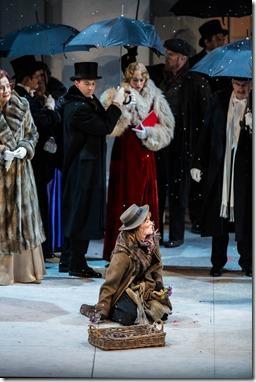
With that much sheer musical manpower, the Lyric production is a gorgeous gift to the ears. From the soaring beauty of "On the Street Where You Live" to the precision harmonies of the Cockney Quartet to the giddy ecstasy of "I Could Have Danced All Night," My Fair Lady is a marvel.
Director Olivier Fredj (replicating director Robert Carsen's original staging for Theatre du Chatelet), My Fair Lady is filled with elaborate visuals and looks as good as it sounds. But for all the superlatives one could apply, it's missing a crucial piece. Minus a sexual spark between the cockney flower girl Eliza Doolittle and her life-altering linguist Henry Higgins, My Fair Lady falters.
By any yardstick, Professor Higgins is a poster-boy for white privilege and misogyny -attributes that nobody had the vocabulary for when the show (based on George Bernard Shaw's ) debuted in 1956. Eliza's not a person to Higgins. She's an ingredient in an experiment to be poked, prodded, worked to the point of exhaustion and eventually trotted out for display like a prize pig.
Higgins' imperiousness is evident in his language and his actions - Eliza is variously called a "squashed cabbage leaf," a "bilious pigeon," and a "draggle-tailed guttersnipe." Eliza is no shrinking violet, of course. She's more than capable of putting the Professor in his place. But without the all-important chemistry with her tormentor, the story doesn't make sense. For all that's right and wonderful about the Lyric's production, it never quite comes together because Eliza and Henry are never believably attracted to each other.
In terms of musicality, the show is a rip-roaring success. My Fair Lady sounds amazing, thanks in large part to Chorus Master Michael Blackand Conductor David Chase. The harmonies of the Cockney Quartet don't just blend, they mesh so tightly you cannot tell where one voice ends and the next begins. Ditto the laments of Higgins' robust team of household servants. And when the entire chorus joins voices for the "Ascot Gavotte," it's with equally fine seamlessness.
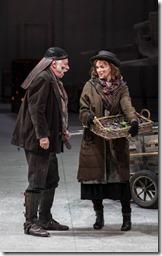
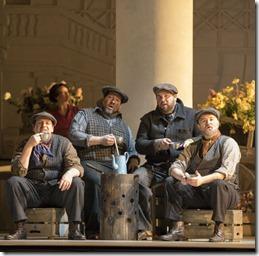
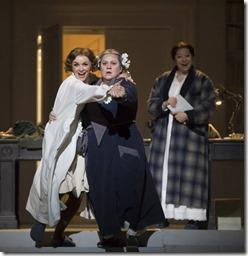
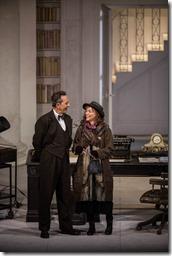
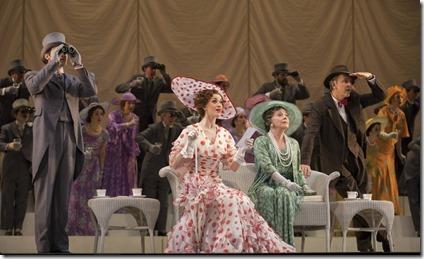
As for the leads, they're impeccable when it comes to delivering the demanding score. As Eliza, Lisa O'Hare (who played the role in the West End tour that came through about eight years ago) has an upper register that's at once delicate and powerful. Her range is formidable: She can growl with glowering vindictiveness plotting 'Enry 'Iggins' untimely death in "Just You Wait" as well as she can soar with ecstasy in "I Could Have Danced All Night." And when she reads the simpering Freddy Eynsford-Hill the riot act in "Show Me," it's with a scorching passion so strong you can almost feel the heat.
Richard E. Grant's Henry Higgins pales a bit in comparison - his solo numbers just aren't as intrinsically musical or powerful as Eliza's. Like Music Man 's Harold Hill, Henry Higgins isn't a bravura vocal part. It can almost be spoken (a la Rex Harrison) as much as sung. Still, Grant has the pipes to make the most of it. His take on "Why Can't the English" is a properly choleric, sliding toward blustering apoplexy as it reaches its finale. And Grant installs "I've Grown Accustomed to Her Face" with just the right amount of wistfulness and puzzlement. (The latter because Higgins prides himself on being the sort of man who has no use for the whims of women). As for the Professor's insufferable sense of entitlement, that too resounds throughout. There's smugness dripping from his every perfectly enunciated word.
Higgins, however, almost cedes leading man status to the floridly memorable Alfred Doolittle (Donald Maxwell), Eliza's scoundrel father. Maxwell is a hoot and a half, blustering about "middle class morality" and - when his ship unexpectedly comes in - lamenting the loss of freedom that comes with a sudden rise to upperclass respectability. If you don't have an infectious grin on your face by the end of "Get Me to the Church on Time," check your pulse. You may be dead.
As the milquetoast, perpetually overwhelmed Freddy, Bryce Pinkham possesses a swoon-worthy tenor that makes "The Street Where You Live" the most romantic four minutes you'll see stage this month. is a taciturn, no-nonsense delight as Higgins' housekeeper Mrs. Pearce. In Gold's hands, Mrs. Pearce is a woman of infinite strong opinions made abundantly clear even when she's not speaking a world. And as Higgins' mother, Helen Carey creates a character who suffers no fools - especially in the person of her son.
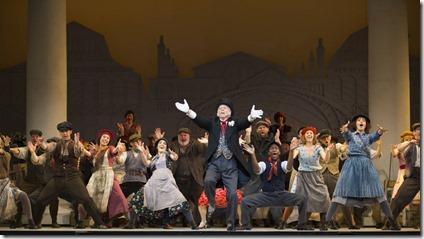
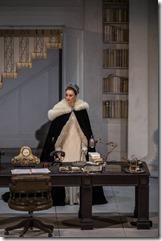
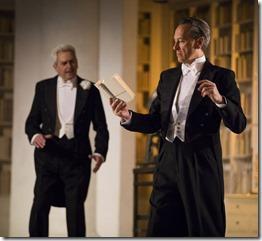
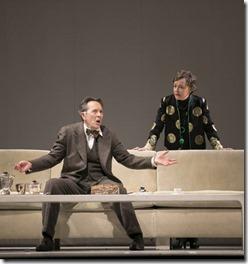
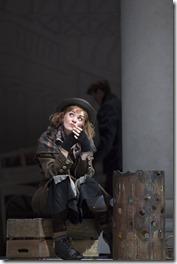
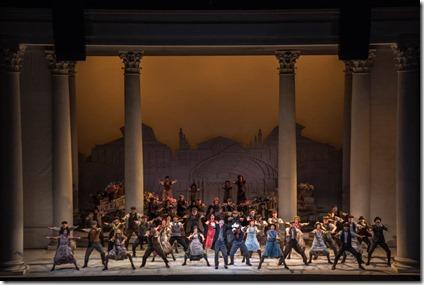
Choreographer Lynne Page's work is eye-popping and story-enhancing throughout, particularly on the raucous, boozy "Get Me to the Church" and the impossibly prim, snooty precision of the "Gavotte."
In a nod to the Greek origins of Shaw's Pygmalion, set designer Tim Hatley surrounds the stage with massive Greek pillars. Clean lines and airy spaces define Professor Higgins' home (where the towering built-in bookshelves will be an object of lust for bibliophiles) and the Cockney neighborhood Eliza initially calls home.
Original director Carsen has made some curious choices as far as costume design. My Fair Lady is set in the early 20th century. Here, the women's dress silhouettes are clearly from the 1940s and '50s. In the final scene especially - when Eliza shows up in a bright red shirtwaist frock and Hatley's set design is dominated by a mod white couch straight out of a Sears catalogue circa 1965 - the time frame is confusing.
Still and all, you will not hear a better sung or better orchestrated musical in Chicago this spring. The sheer number of voices onstage and in the orchestra pit make for a golden sound, and the ensemble has talent in proportion to its numbers. When all those voices are lifted, the result is a joyful noise indeed.
My Fair Lady continues through May 21st at Civic Opera House, 20 N. Wacker (map). Tickets are $22-$199, and are available by phone (312-827-5600) or online through their website (check for half-price tickets at Goldstar.com ). More information at LyricOpera.org. (Running time: 2 hours 50 minutes, includes a 20-minute intermission)
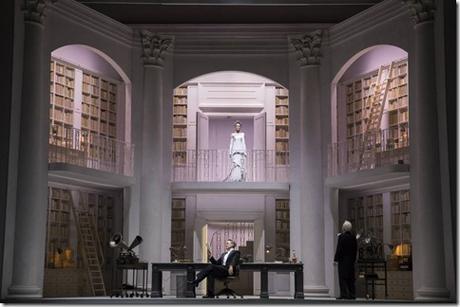
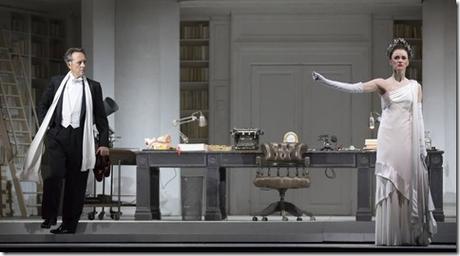
Photos by Todd Rosenberg and Andrew Cioffi
Lisa O'Hare (Eliza Doolittle), Richard E. Grant (Henry Higgins), Jeff Diebold (understudy Henry Higgins), Jennie Sophia (understudy Eliza Doolittle), Bryce Pinkham (Freddy Eynsford-Hill), Nicholas Le Prevost (Colonel Pickering), Donald Maxwell (Alfred Doolittle), (Mrs. Pearce), Helen Carey (Mrs. Higgins), Michael Joseph Mitchell (Zolton Karpathy, understudy bartender, Lord Boxington, butler), Carman Roman (Mrs. Eynsford-Hill), Bill McGough (George the Bartender, Lord Boxington), Peggy Roeder (Lady Boxington, angry woman, understudy Mrs. Higgins), Jackson Evans (Harry, Charles, understudy Zolton Karpathy), James Romney (Jamie), David Lively (butler, understudy, Colonel Pickering), Sara Sevigny (Mrs. Hopkins, understudy Mrs. Pearce, Lady Boxington, Angry Woman), Skyler Adams (understudy Harry, Charles, James), Hoss Brock (ensemble, Cockney Quartet, Selsey man), Matthew Carroll (ensemble, servant, footman), Sharon Garvey Cohen (Queen of Transylvania, ensemble), Janet Marie Farr (Mrs.Higgin's maid, ensemble), Matthew Keefer (Servant, ensemble, understudy Freddy Eynsford-Hill, Cockney quartet), Peter Morgan (Another bystander, Cockney quartet, ensemble), Kenneth Nichols (servant, ensemble, understudy Cockney Quartet), Joe Shadday (Horton man, Cockney Quartet, ensemble), Will Skrip (servant, ensemble, understudy Cockney Quartet), Yvette Smith (ensemble, understudy Queen of Transylvania, servant), Marie Sokolova (servant, ensemble), Corrine Wallace Crane (Second Maid, ensemble, understudy Mrs. Eynsford-Hill, Mrs. Hopkins) Laura Seely Vassalli (first maid, ensemble), James Odom (understudy servant, ensemble), Sherry Watkins (ensemble, understudy Mrs. Higgins' maid, servant), Nikolas Wendell (Cockney Quartet, bystander, ensemble), Pamela Williams (ensemble, servant, understudy maids), Fred Zimmerman (understudy Alfred P. Doolittle, ensemble), Ron Watkins (Prince of Transylvania, ensemble, understudy Cockney Quartet, servant), Thomas Lewis Potter, Dominic Rescigno, Stephen Schellhardt, Vince Wallace (ensemble).
Aubrey Adams, Shannon Alvis, Kristian Brooks, Daniel Gold, Tasha Heggem, James E. Johnson V, Ethan R. Kirschbaum, Terrence Marling, Jamy Meek, Hayley Meier, Jessica Wolfrum Raun, Todd Rhoades, Jacqueline Stewart, J. Tyler Whitmer (dancers).
Kathleen Brauer (concertmaster, Violin 1), Alexander Belavsky, Pauli Ewing, Heather Wittels, Ann Palen, Frank W. Babbitt, David Wolfe (violin 1), John MacFarlane (principal violin 2), Bonita Dance i Bello, Albert Wang, Peter Labella, Patrick Brennan (Violin 2), Terri Van Valkinburgh (principal viola), Amy Hess, Di Shi, Karl Davies (viola), Laura Deming (principal cello) Walter Preucil, William H. Cernota (cello), Ian Hallas (principal bass) Collins Trier (bass), Dionne Jackson (principal flute, piccolo), Robert E. Morgan (principal oboe, English horn), Leslie Grimm (principal clarinet), Sergey Gutorov (clarinet), Lewis Kirk (principal bassoon), Samuel Hamzem (principal horn), Noel Kimmel (horn), William Denton (principal trumpet), Channing Philbrick, Matthew Comerford (trumpet), Jeremy Moeller (principal trombone), David Becker (trombone), Andrew Smith (principal tuba), Edward Harrison (principal percussion, timpani), Douglas Waddell (principal percussion), Lynn Williams (principal harp), Wendy Skoczen (librarian), Christine Janecki (contractor).
behind the scenes
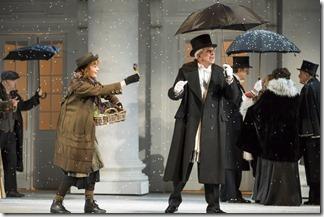
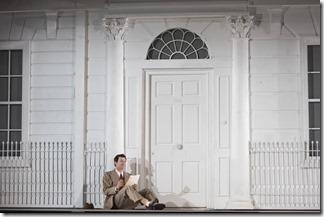
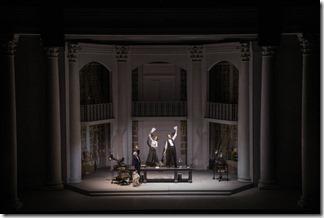
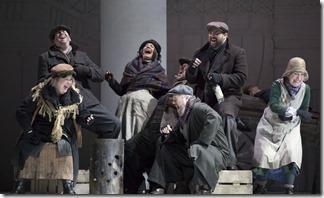
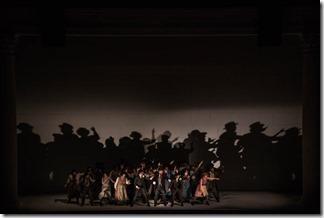
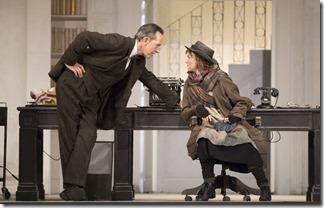
David Chase (conductor), Robert Carsen for Theatre du Chatelet (original direction, co-lighting design), Olivier Fredj (revival director), (choreographer), (scenic design), Anthony Powell (costume design), Philippine Ordinaire (assistant set designer), Frederic Llinares (assistant costume designer), Giuseppe Di Iorio (co-lighting designer), Mark Grey (sound design), Michael Black (chorus master), Rebecca Howell (assistant choreographer), Sarah Hatten (wigmaster and makeup design), Matthew Ozawa (associate director), Elise Sandell (assistant director), John W. Coleman (stage manager), Rachel C. Henneberry, Rachel A. Tobias (assistant stage managers), Valerie Maze (assistant choreographer), Tim Leniham, William C. Bellingham (music preparations), Ian Burton (dramaturgy), Christine Adaire (dialect coach), Todd Rosenberg , Andrew Cioffi (photographers)
Tags: 17-0461, Alan Jay Lerner, Albert Wang, Alexander Belavsky, Amy Hess, Andrew Cioffi, Andrew Smith, Ann Palen, Anthony Powell, Aubrey Adams, Bill McGough, Bonita Dance i Bello, Bryce Pinkham, Carman Roman, Catey Sullivan, Channing Philbrick, Chicago musical theater, Chicago Theater, Christine Adaire, Christine Janecki, Cindy Gold, Civic Opera House, Collins Trier, Corrine Wallace Crane, Daniel Gold, David Becker, David Chase, David Lively, David Wolfe, Di Shi, Dionne Jackson, Dominic Rescigno, Donald Maxwell, Douglas Waddell, Edward Harrison, Elise Sandell, Ethan R. Kirschbaum, Frank W. Babbitt, Fred Zimmerman, Frederic Llinares, Frederick Loewe, George Bernard Shaw, Giuseppe Di Iorio, Hayley Meier, Heather Wittels, Helen Carey, Hoss Brock, Ian Burton, Ian Hallas, J. Tyler Whitmer, Jackson Evans, Jacqueline Stewart, James E. Johnson V, James Odom, James Romney, Jamy Meek, Janet Marie Farr, Jeff Diebold, Jennie Sophia, Jeremy Moeller, Jessica Wolfrum Raun, Joe Shadday, John Macfarlane, John W. Coleman, Karl Davies, Kathleen Brauer, Kenneth Nichols, Kristian Brooks, Laura Deming, Laura Seely Vassalli, Lerner and Loewe, Leslie Grimm, Lewis Kirk, Lisa O'Hare, Lynn Williams, Lynne Page, Lyric Opera, Marie Sokolova, Mark Grey, Matthew Carroll, Matthew Comerford, Matthew Keefer, Matthew Ozawa, Michael Black, Michael Joseph Mitchell, Nicholas Le Prevost, Nikolas Wendell, Noel Kimmel, Olivier Fredj, Pamela Williams, Patrick Brennan, Pauli Ewing, Peggy Roeder, Peter Labella, Peter Morgan, Philippine Ordinaire, post, Pygmalion, Rachel A. Tobias, Rachel C. Henneberry, Rebecca Howell, Richard E. Grant, Robert Carsen, Robert E. Morgan, Ron Watkins, Samuel Hamzem, Sara Sevigny, Sarah Hatten, Sergey Gutorov, Shannon Alvis, Sharon Garvey Cohen, Sherry Watkins, Skyler Adams, Stephen Schellhardt, Tasha Heggem, Terrence Marling, Terri Van Valkinburgh, Theatre du Chatelet, Thomas Lewis Potter, Tim Hatley, Tim Leniham, Todd Rhoades, Todd Rosenberg, Valerie Maze, Vince Wallace, Walter Preucil, Wendy Skoczen, Will Skrip, William C. Bellingham, William Denton, William H. Cernota, Yvette Smith
Category: Catey Sullivan, Civic Opera House, George Bernard Shaw, Lerner and Loewe, Lyric Opera, Musical, Tony Awards, Video, YouTube

